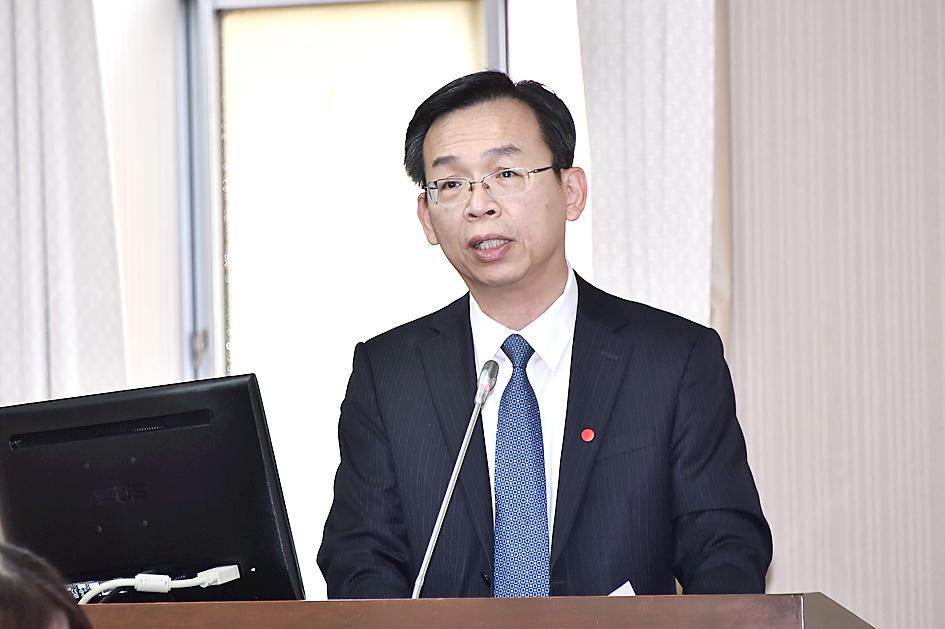Government bonds would be issued to increase the Civil Aeronautics Administration (CAA) Operating Fund by NT$30 billion (US$1.04 billion), CAA Director-General Lin Kuo-hsien (林國顯) confirmed yesterday.
Lin made the statement at a meeting of the legislature’s Transportation Committee, which was scheduled to review the budget plans submitted by the CAA and Taoyuan International Airport Corp (TIAC) for the 2021 fiscal year.
Democratic Progressive Party (DPP) Legislator Lee Kun-tse (林昆澤) said that the Ministry of Transportation and Communications has rolled out a series of relief packages and travel subsidies that have temporarily stabilized the market.

Photo: Tu Chien-jung, Taipei Times
However, the International Air Transport Association has forecast that the global air transport market would not return to the level seen last year until 2024, which means that international flight carriers have yet to face their toughest trials, Lee said.
Lin said that the CAA and TIAC have given excessively rosy forecasts for the air transport market in the next fiscal year.
TIAC’s budget proposal said that the number of the passengers accessing Taiwan Taoyuan International Airport is estimated to top 42.84 million for the next fiscal year, down from 49.08 million projected for this fiscal year.
The airport operator estimated that business revenue in the next fiscal year could top NT$20.12 billion, down from NT$22.85 billion in this fiscal year.
“However, the airport was accessed by about 7.16 million passengers in total as of September, with about 6.75 million accessing the airport from January to March, when the nation’s borders were still open,” Lee said.
“While the airport operator projected that it would receive NT$4.638 billion in airport service fees next year, it only collected NT$739 million between January and September, which would create a budget shortfall of more than 60 percent,” Lee said.
Lee asked Lin, who also serves as TIAC acting chairman, if government bonds would be considered to help raise funds.
Lin said that the budget plan was stipulated at the beginning of last year, but the COVID-19 pandemic broke out at about the end of January and the beginning of February.
Despite the steep decline in revenue, the airport’s expenditure would increase, as it needs funds to maintain airport facilities and build a third runway and terminal, he said.
“Currently, we can still endure with the CAA Operating Fund. However, because of a decrease in revenue, we have asked permission from the Ministry of Finance to issue government bonds of NT$30 billion to raise money for operating funds,” Lin said.
Additional funds needed by the airport would be secured through short-term loans, he said.
This would be the first time in 48 years that the government has issued bonds to raise money for the CAA Operating Fund.
The decline in passengers accessing the airport also has affected the Tourism Development Fund, which is partially funded by airport service fees.
Asked how the government plans to replenish the almost depleted Tourism Development Fund, Minister of Transportation and Communications Lin Chia-lung (林佳龍) said that it would seek funds allocated by the Executive Yuan and raise NT$6 billion by issuing government bonds, adding that the Tourism Bureau is making detailed assessments of the situation.

A magnitude 4.9 earthquake struck off Tainan at 11:47am today, the Central Weather Administration (CWA) said. The hypocenter was 32.3km northeast of Tainan City Hall at a depth of 7.3km, CWA data showed. The intensity of the quake, which gauges the actual effect of a seismic event, measured 4 in Tainan and Chiayi County on Taiwan's seven-tier intensity scale, the data showed. The quake had an intensity of 3 in Chiayi City and County, and Yunlin County, while it was measured as 2 in Kaohsiung, Nantou County, Changhua County, Taitung County and offshore Penghu County, the data showed. There were no immediate reports of

Weather conditions across Taiwan are expected to remain stable today, but cloudy to rainy skies are expected from tomorrow onward due to increasing moisture in the atmosphere, according to the Central Weather Administration (CWA). Daytime highs today are expected to hit 25-27°C in western Taiwan and 22-24°C in the eastern counties of Yilan, Hualien, and Taitung, data on the CWA website indicated. After sunset, temperatures could drop to 16-17°C in most parts of Taiwan. For tomorrow, precipitation is likely in northern Taiwan as a cloud system moves in from China. Daytime temperatures are expected to hover around 25°C, the CWA said. Starting Monday, areas

Taiwan has recorded its first fatal case of Coxsackie B5 enterovirus in 10 years after a one-year-old boy from southern Taiwan died from complications early last month, the Centers for Disease Control (CDC) said yesterday. CDC spokesman Lo Yi-chun (羅一鈞) told a news conference that the child initially developed a fever and respiratory symptoms before experiencing seizures and loss of consciousness. The boy was diagnosed with acute encephalitis and admitted to intensive care, but his condition deteriorated rapidly, and he passed away on the sixth day of illness, Lo said. This also marks Taiwan’s third enterovirus-related death this year and the first severe

A Taiwanese software developer has created a generative artificial intelligence (AI) model to help people use AI without exposing sensitive data, project head Huang Chung-hsiao (黃崇校) said yesterday. Huang, a 55-year-old coder leading a US-based team, said that concerns over data privacy and security in popular generative AIs such as ChatGPT and DeepSeek motivated him to develop a personal AI assistant named “Mei.” One of the biggest security flaws with cloud-based algorithms is that users are required to hand over personal information to access the service, giving developers the opportunity to mine user data, he said. For this reason, many government agencies and